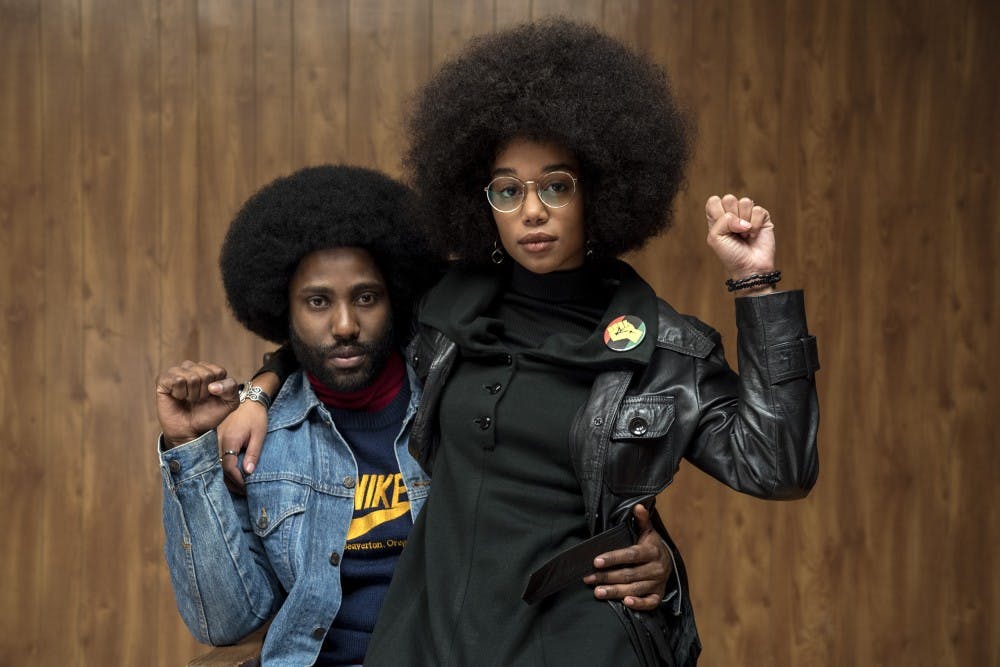“BlacKkKlansman” will rightfully be described by many as an angry film. Both an energetic period piece that exudes style and class, and a hard-as-nails look at modern racism and political regression, it’s an impassioned work to be sure.
At the heart of the film is the true story of Ron Stallworth, the first ever African-American detective to serve in the Colorado Springs Police Department, who successfully infiltrates a local Ku Klux Klan chapter.
With “BlacKkKlansman,” Lee effectively subverts the issues of political commentary by way of period piece movie. For all the films about past oppression, here is one willing to recognize that past injustices have merely grown and morphed into present pains. That it’s willing to do so with an energetic grace and an occasional wink and nod is the icing on top.
Lee invites viewers to situate the narrative in a modern context with a prologue featuring Alec Baldwin as a greasy, racist slimeball who spews hatred and vitriol, hilariously stumbling over his words. It recalls, of course, Baldwin’s frequent performances as Saturday Night Live’s cartoonish rendition of Donald Trump.
Another thematic bookend at the end of the film provides an even more gut-wrenching reminder. There are two endings to “BlacKkKlansman": one a pseudo-cheery happy ending dripping with all the kitschy retro charm one might expect of such a period piece, and the other a hard-hitting hybrid of horror and documentary. As Lee’s happy ending reveals itself as farce, he plunges again into the realities of hate and racism.
It’s a sequence that eschews convention and recalls the surrealist impressionism of David Lynch, framing the bleak sight of a cross burning like it’s the bonfire from “The Witch.” And it’s absolutely the most stunning portion of the film. Lee’s camera pays close attention to the members of the Klan. He fixates on eyes, largely because they’re so expressive, but also to create a meaningful juxtaposition between past and present.
As Lee’s tempest of racist terrors rages on, he moves forward in time to footage of the rallies in Charlottesville, where white supremacists and neo-Nazis marched sans disguise, so entitled in their hatred and so supported by a nation of bigotry that there was no fear of consequences for boasting such ideals.
It is, like the rest of the film, searing, angering and forceful.
Though it’s based on a stranger-than-fiction true story – the movie’s opening credits proclaim that “Dis joint is based on some fo’ real, fo’ real sh*t” – Lee’s movie is a liberal adaptation of that story, meant to immortalize it as a stylish pop thriller and a thematically nuanced discussion of social orders, hate groups, extremism and the interplay between them all. He’s firing on all cylinders.
Beside Stallworth are a wealth of interesting supporting characters Lee has altered from their real-life counterparts or fabricated entirely to better flesh out the movie's thematic palette. There’s a potential romantic interest in the form of Patrice, a Black Power activist, and Lee has also rewritten Stallworth's real-life partner Flip Zimmerman as Jewish to complicate the movie's interplay between hate and hated.
It’s a lovely cast of characters because of the themes their presence allows Lee to delve into.
Throughout “BlacKkKlansman,” he creates a layered and always interesting tapestry of social and political ideals that’s reverent where appropriate, as with Patrice’s staunchly anti-cop and black power ideals and Zimmerman’s emotional struggles coping with the Klan’s pervasive anti-Semitism, and hilariously irreverent at most of the right moments.
Lee has a blast criticizing the Klan, and what he’s created here on a purely comedic level feels significant because he’s willing to make racists the butt of any joke while also interrogating the social structures that empower them. It feels like an acknowledgement that racism itself is a terrifying social and cultural menace not to be dismissed, but its perpetrators are bumbling clowns.
It’s an uneven film at times, but a magnificently crafted one and a vital work for today’s political climate. I left the theater feeling dejected but impassioned. Lee’s new joint is stirring and endlessly provocative in its ability to evoke in equal measures an anger and a fear that mark the first steps toward change. And it’s an anger and a fear that, all things considered, ought to be felt more often.






